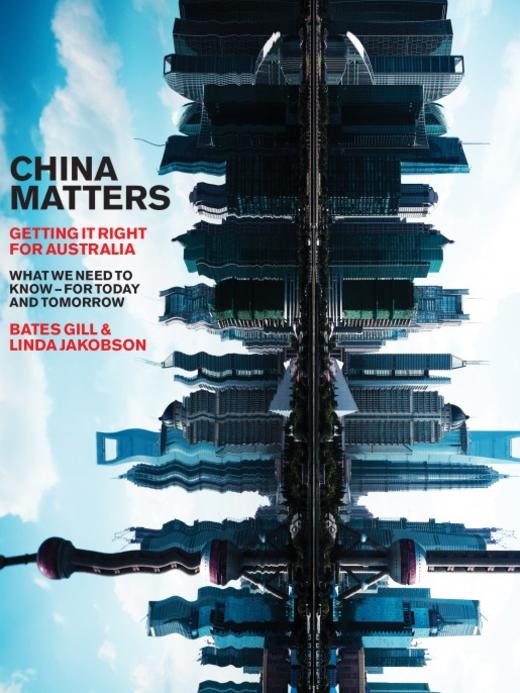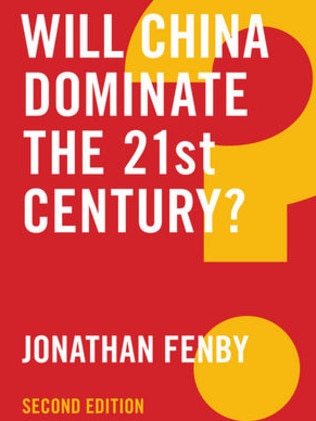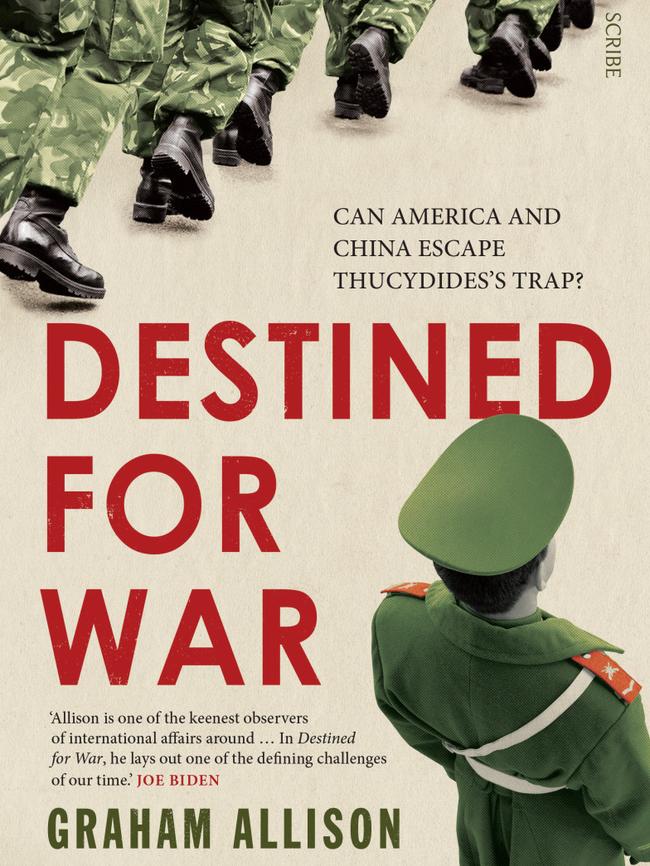Destined For War; China Matters; Will China Dominate 21st Century
With the rise of China the biggest story in geopolitics, these three books should be read and discussed

The rise of China is the biggest story in geopolitics. We fuss about where we stand between China and the US; the end of the commodities boom and our future place in China’s economic development; uncertainties engendered by Donald Trump’s leadership; and the systematic efforts of the Chinese Communist Party to buy influence in our institutions and stifle criticism of its own policies and mode of government.
The three books under review should be read and discussed. They enliven this debate.
From an Australian point of view, the most useful is Bates Gill and Linda Jakobson’s China Matters. From the perspective of international security and geopolitics, Graham Allison’s Destined for War is the most important. Jonathan Fenby’s Will China Dominate the 21st Century? is a useful supplement to the other two.

Jakobson and Gill came to Australia from abroad. Jakobson created the China Matters forum to bring together specialists from business, government, academe and journalism. The quietly thoughtful Gill is professor of Asia-Pacific strategic studies at the Australian National University.
“Upon moving to this country several years ago,” the authors write, “we were both struck by a sense that Australians do not entirely grasp how vast China’s impact will be on Australia’s future.”
They make many recommendations in this book. They urge Australia to create a national peak body with a mandate to advance the Australia-China relationship as it enters an unpredictable and challenging era. They also recommend that Asian literacy be institutionalised. Learning about Asian cultures and societies should be made compulsory from year one onward. These and other suggestions call for critical assessment.
A peak body of the kind suggested would run the risk of being captured by interest groups and infiltrated by Chinese money. It’s not a “peak body” we need but serious scholarship and policy engagement among our universities and research institutes to bring new ideas and voices into the policy debates and build broader understanding of the challenges ahead.
Kevin Rudd poured $60 million into the Centre for China in the World at ANU. It has shown a poor return on that investment in terms of strategic analysis, real-world scholarship or public outreach.

Any new initiative must be based not on the casual whims of politicians but on robust principles designed to deliver outcomes in the national interest. And it must not take Chinese money, whether directly from the Chinese government or through billionaire “philanthropists” with close links to the Chinese Communist Party.
A mandatory curriculum is also problematic. We don’t teach our children any coherent course on Western civilisation. How, then, are we going to teach them about a multitude of Asian histories and cultures? The proposal also shows a lack of awareness of the institutional restraints on mandatory curriculum innovation in Australia’s state-based schools system and little familiarity with the past 30 years of educational debate on Asia literacy in this country.
Rather than another foray into ill-conceived mass education, we need a few good university seminars comparing and contrasting classical Mediterranean and classical Chinese history. One might be the parallel between the history of classical Greece and Rome and that of China during the warring states period and the rise of the Qin and Han empires, in both cases running from about 500BC to 50BC.
Arthur Kroeber, a veteran analyst of the Chinese economy, in his chapter for the book, China’s Economic Transition: Will It Succeed?, makes a striking judgment: “If current trends continue unabated, it is likely China’s debt burden will trigger either a financial crisis or a severe growth slowdown by 2020 at the latest and quite possibly sooner.”
That is a near timeframe. He argues major reforms are imperative if growth of about 5 per cent a year is to be sustained beyond 2020. He thinks these are unlikely to be achieved and that growth could stall, as it did in Japan in the 1990s and in the EU in recent years. This argument needs to be rigorously tested.
Similarly, Fenby argues China will not dominate the 21st century because its growth probably will stall, trapping China in the middle-income bracket so that it grows old before it grows rich. He also argues China’s soft-power offensive will fail because its narcissistic view of itself as the Middle Kingdom and its overweening ambitions alienate almost all its neighbours and lack the cosmopolitanism of the Western culture that created globalisation.

Allison, a Harvard scholar of international security affairs, urges us all to re-read Thucydides’s history of the Peloponnesian War so as to think seriously about the psychology of conflict and the logic of power.
He believes Thucydides teaches a vital lesson, one we should heed before it’s too late: a rising power (read China) tends to challenge a declining one (read America), and we should not want a Sino-American war.
He offers several historical analogies in an attempt to show that Thucydides was right about rising and declining powers. But his central lesson is ill-founded. The “declining” power in ancient Greece (Sparta) won the war. The rising power (Athens) lost. And the lessons Thucydides offers us are much more complex than the one Allison wishes to draw.
In any case, his history of China is cliched and on several points incorrect. He uncritically buys into the “5000 years of civilisation” mystique and the notion that the Chinese think far ahead in ways that we in the West do not. This is nonsense. Their utter failure to do such things under the Ming (14th to 17th centuries) and Manchus (17th to early 20th centuries), in stark contrast with the Japanese, for example, from 1868, hobbled them.
He writes uncritically about China being the globally dominant state for “millennia” before the Western powers “humiliated” it in the 19th century. It was nothing of the kind. It fragmented in the middle of the first millennium AD on several occasions, and was conquered by the Mongols in the 13th century and the Manchus in the 17th century. Even their empires, far larger than China under any of its native dynasties, did not dominate the world. If anything, both sets of invaders held China back.
The Manchus were foreign and resented, but it was them, not the Han Chinese, who conquered Central Asia, Mongolia and Tibet in the 18th century. He writes of their downfall without any reference to the huge civil wars within China such as the Taiping Rebellion, the belated constitutional reforms in the 1900s, the non-communist republican movement or the serious intellectual debates in China about modernity and liberty.
He reproduces the cliche about Mao Zedong’s party saving China “from domination by foreign imperialists”. It was the US that saved China by defeating Japan in the Pacific War. Mao’s guerillas faced crushing defeat by Chiang Kai-shek had it not been for the Japanese invasion, the American defeat of Japan, the Soviet occupation of Manchuria and arming of the Chinese communist forces.
He writes that Japan took over Manchuria in 1894. It did not do so until 1931. In the decades before that, it had invested intensively in Manchurian infrastructure and industrialisation. By the early 1930s, Manchuria was the most developed and prosperous area of a China otherwise mired in internal warlordism.
He writes that Taiwan’s 23 million people are descended from those who fled Mao in 1949. In fact, only 15 per cent of Taiwan’s population is of that lineage. The rest have far deeper roots on the island.
All this is rather disturbing, given Allison urges us to study history carefully ourselves. That an emeritus strategic thinker at Harvard, surrounded by China scholars, could make so many elementary errors about his core topic is dismaying.
In the interim, however, by all means take his advice and read Thucydides, who was a great historian.
Paul Monk is former head of the China desk in the Defence Intelligence Organisation and the author of Thunder From the Silent Zone: Rethinking China.
Destined for War: Can America and China Escape Thucydides’s Trap?
By Graham Allison
Scribe, 384pp, $35
China Matters: Getting It Right for Australia
By Bates Gill and Linda Jakobson
La Trobe University Press, 256pp, $29.99
Will China Dominate the 21st Century?
By Jonathan Fenby
Polity Press, 144pp, $21.95




To join the conversation, please log in. Don't have an account? Register
Join the conversation, you are commenting as Logout